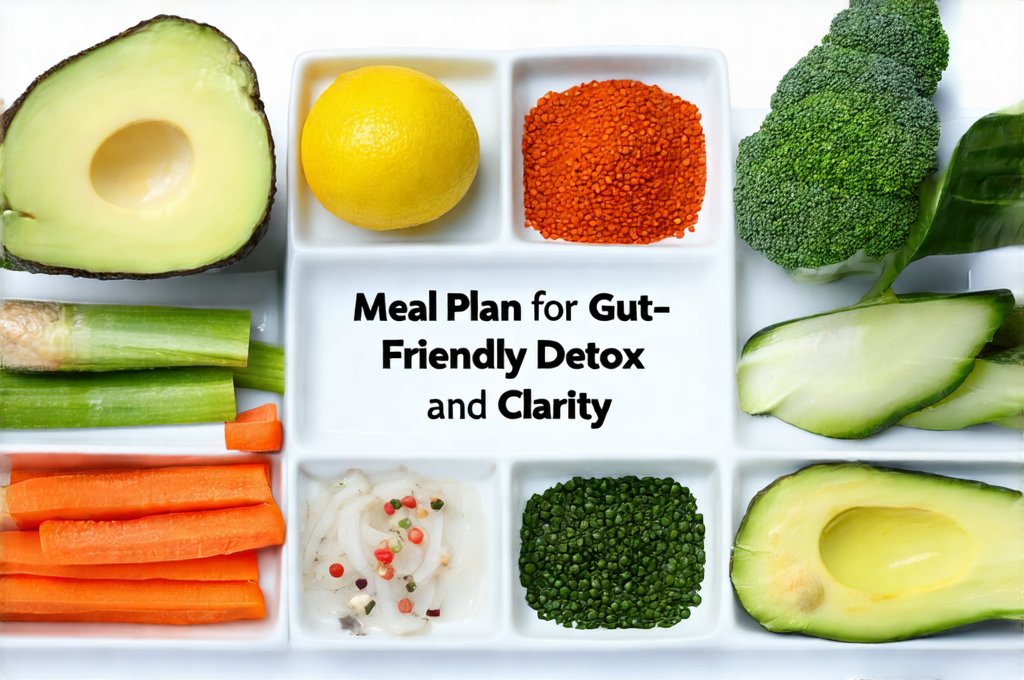Our modern lifestyles – packed with processed foods, chronic stress, and environmental toxins – often take a toll on our gut microbiome. This delicate ecosystem within us plays a crucial role not only in digestion but also in immunity, mental clarity, and overall wellbeing. When the gut becomes unbalanced, it can lead to bloating, fatigue, brain fog, and even more serious health concerns. A ‘detox’ isn’t about restrictive diets or harsh cleanses; instead, it’s about nourishing your body with whole, unprocessed foods that support natural detoxification pathways and restore a healthy gut environment. This article provides a meal plan designed to gently support your gut, promoting clarity and vitality without deprivation.
This approach centers around food as medicine, focusing on ingredients known for their prebiotic and probiotic properties, anti-inflammatory benefits, and ability to support liver function – the body’s primary detoxification organ. It’s about creating sustainable habits that prioritize nourishment over restriction. This isn’t a quick fix but rather a pathway towards long-term gut health and improved wellbeing. Remember to listen to your body, adjust portion sizes as needed, and consult with a healthcare professional before making significant dietary changes, especially if you have underlying health conditions.
Understanding the Gut-Clarity Connection
The gut and brain are intimately connected via what’s known as the gut-brain axis. This bidirectional communication highway means that what happens in your gut directly impacts your brain – and vice versa. A healthy gut microbiome supports optimal neurotransmitter production, including serotonin (the “happy hormone”) and dopamine (involved in motivation and reward). When the gut is compromised, this can disrupt these processes leading to mood swings, anxiety, and difficulty concentrating. Inflammation in the gut has also been linked to increased brain fog and cognitive decline.
Diet plays a huge role in influencing this axis. Foods high in processed sugars and unhealthy fats can promote inflammation and dysbiosis (an imbalance of gut bacteria), while nutrient-rich foods support a thriving microbiome and reduce inflammation. Prioritizing gut health is therefore a powerful way to enhance mental clarity, focus, and emotional wellbeing. Furthermore, the liver plays an integral role in detoxification processes. Supporting liver function through dietary choices – like incorporating cruciferous vegetables and bitter greens – allows the body to efficiently eliminate toxins, further contributing to improved mental and physical energy levels.
A key element of this approach is focusing on foods that are easily digestible. This reduces the burden on your digestive system, allowing it to focus on nutrient absorption and detoxification rather than constantly working overtime to break down complex or processed foods. This often means emphasizing cooked vegetables over raw (especially for those with sensitive digestion), incorporating fermented foods in small amounts, and choosing lean protein sources.
Sample 7-Day Gut-Friendly Meal Plan
This meal plan is a starting point – feel free to adjust it based on your preferences and dietary needs. It emphasizes whole, unprocessed foods that support gut health and detoxification. Portion sizes should be adjusted according to individual calorie requirements and activity levels.
Day 1:
* Breakfast: Oatmeal with berries, chia seeds, and a sprinkle of cinnamon.
* Lunch: Large salad with grilled chicken or fish, mixed greens, avocado, cucumber, and olive oil vinaigrette.
* Dinner: Baked salmon with roasted sweet potatoes and steamed broccoli.
* Snacks: A handful of almonds, Greek yogurt with a drizzle of honey.
Day 2-7: Continue to rotate similar meals incorporating different lean proteins (turkey, lentils), vegetables (spinach, kale, carrots), and healthy fats (avocado, olive oil). Focus on variety within these guidelines. Remember hydration is key – aim for at least 8 glasses of water per day.
Incorporating Prebiotics & Probiotics
Prebiotics are essentially food for your gut bacteria, helping them to thrive. Excellent sources include:
– Garlic
– Onions
– Leeks
– Asparagus
– Bananas (slightly green)
– Oats
– Apples
Probiotics, on the other hand, are the beneficial bacteria themselves. They can be found in fermented foods like:
– Yogurt (unsweetened, with live cultures)
– Kefir
– Sauerkraut
– Kimchi
– Kombucha (check sugar content)
It’s important to note that introducing probiotics too quickly or in large amounts can sometimes cause digestive upset. Start slowly and gradually increase your intake as tolerated. Combining prebiotics and probiotics creates a synergistic effect, feeding the good bacteria and helping them flourish. This dynamic duo is essential for maintaining a healthy gut microbiome.
Hydration & Liver Support
Adequate hydration is crucial for detoxification, as water helps flush out toxins through the kidneys and digestive system. Aim to drink at least eight glasses of filtered water per day – even more if you are active or live in a hot climate. Herbal teas (ginger, dandelion root) can also contribute to hydration and offer additional support for liver function.
Supporting your liver’s natural detoxification processes is another key component of this plan. Incorporate foods known to promote liver health:
– Cruciferous vegetables (broccoli, cauliflower, Brussels sprouts): contain compounds that aid in detoxification.
– Bitter greens (kale, arugula, dandelion greens): stimulate bile production, which helps the body eliminate toxins.
– Turmeric: contains curcumin, a powerful anti-inflammatory compound with antioxidant properties.
– Beetroot: supports liver function and blood cleansing.
Avoid excessive alcohol consumption, processed foods, and high amounts of sugar, as these can place an additional burden on your liver. Think of supporting your liver as giving it the resources it needs to do its job effectively.
This meal plan is a starting point for cultivating a healthier gut and achieving greater clarity. It’s about making sustainable choices that nourish your body from the inside out. Remember, consistency is key, and listening to your body’s signals will guide you on your journey towards optimal wellbeing.




